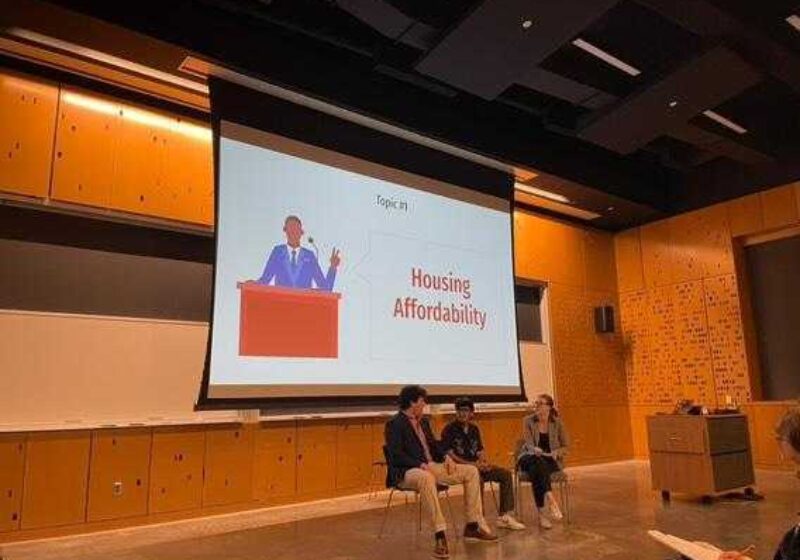I am no fan of obligatory sequels. When I heard that the College Democrats and Republicans were going to have another debate, I considered skipping it at first; I said all I needed when I wrote about them last semester. However, I was told that they’d requested the Campus Times not attend, and the Marxist in me saw the beauty of a club which would not have me as a member. I figured I’d check back up on them.
If you are the type of sicko who pays attention to electoral politics year round, debates are less of a learning opportunity and more of a tedious obligation. No new intellectual ground is ever broken at a debate, and any voter who goes to one sincerely expecting to learn is doing themselves a great disservice. Debates are only useful insofar as they are a convenient microcosm of whatever rhetoric is en vogue at the time. When I went to watch the partisans duke it out, I was going not to learn, but to study.
The housing portion was the driest of the debate. The Democrats trotted out what I expect will continue to be the party rhetoric, crying “tax the rich” and then clarifying that their agenda consists mostly of complicated tax incentives rather than anything approaching a government program. It appears that people respect Bernie’s brand, just not his policies. The Republican debater — who I recognize as being such a fan of my work that he once came up to me, appearing quite intoxicated, so starstruck that he could only quote his favorite passages to me — rose to say housing should be a commodity, and that the way to fix the housing crisis was to pass bills encouraging everyone to become a mini-landlord. Little thought was given for people struggling with housing insecurity or outrageous rent hikes, they can rent some homeowner’s shed. For the really poor, vouchers. Bully.
Ranked-choice voting was no more inspiring than housing. The Republican speaker valiantly argued against any reform, except perhaps eliminating primaries and letting party bosses decide nominees instead. The speaker seemed to be advocating for whatever combination of democracy and not-democracy achieved his preferred policy outcomes. It was powerful and disheartening to see a man my age excitedly talk about the genius and foresight of the Founding Fathers and the beauty of the structure of American government. We took the lead out of the paint and gasoline, and still some of our citizens are cognitively struggling.
The middle of the debate is where I must focus the most of my policy attention. Nothing else I heard in the debate struck me as particularly new. I had seen again, as I did last year, how Democrats, living almost entirely in an era where the national party eschewed ideology beyond opposition to the Republicans, stumbled again and again when trying to articulate a clear vision for the future. I had also seen a white man smugly tell the audience the world was great actually, except for all the people getting in his way.
The climate change portion was the only moment where I could feel something novel happening. It seemed impossible that a man my age could stand before an audience of his peers and say that he believed, like the leaders of his national party, that climate change was some sort of evil hoax (possibly Jewish in origin). Indeed, he did not let me down, saying on the reality of climate change: “Across the spectrum you’ll find no disagreement here.” Almost immediately I received the spin. The real problem was not climate change, but that dreaded dogma, “safetyism.” We must be vigilant to prevent too much from being done about climate change, lest it adversely affect the beloved economy. Young people are too scared by the reality of climate change to have the adequate amount of children, which is something these freaks care about apparently. We should favor a multidisciplinary approach to climate science, that balances climate scientists’ opinions with people who don’t study climate science, like economists. I was assured that the economic damage of climate change came out to about $200 million a year, a mere rounding error in the Pentagon’s budget. If you sincerely believe that climate change will be that minor, I have beachfront property to sell you.
It was an incredible experience. I felt like I saw the future. We have passed the point where rational people can deny to themselves or others that climate change exists, and so we must reformat climate denialism for the new generation. What is important is not action, but to have the proper talking points for when someone says they’re worried that they will be driven from their home. It is an insulting variety of conservatism that feigns concern for the price of gasoline for people in the global south as they are directly killed by rising temperatures. It is the fresh new perspective of the people that will kill millions. If people like the College Republicans are the people leading us in the future, I am tempted to agree with them that we are too stupid for democracy.






